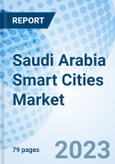The Saudi Arabia smart cities market is experiencing continuous growth, driven by government efforts for digital transformation aligned with the strategic goals of the National Transformation Program 2020 and Saudi Vision 2030. Moreover, the Saudi government is actively endorsing the transformation of major cities, including Riyadh, Jeddah, Al Madina Al Munawara, Makkah, and Dammam, into smart cities. Their additional aim is to convert eleven more cities into smart cities by 2030 in response to the increasing urban population, which is projected to reach 97.6% by 2030, up from 84.7% in 2021. In addition to these efforts, there is a strong emphasis on reducing reliance on oil by increasing the share of non-oil exports in the non-oil GDP from 16% to 50% by 2030. This strategic shift is expected to drive higher investments in smart city infrastructure, further boosting the growth of the smart cities market in the years ahead.
According to the report, Saudi Arabia's Smart Cities Market size is anticipated to grow at a CAGR of 17.7% during 2023-2029F. Several mega smart city projects are in progress, including the $500 billion NEOM project, the $500 million Al Nama Smart City, and the $500 million Qiddya Entertainment City. These projects are expected to generate substantial demand for smart components and technologies, thus catalysing the growth of smart cities in Saudi Arabia in the years ahead. Furthermore, there is a noticeable shift in the allocation of funds towards digital transformation, with the share of spending on digital initiatives expected to rise to approximately 50% by 2025, a substantial increase from the 33% recorded in 2020. Within this digital spending, around 43% is designated for the development of smart cities across various sectors, including government, healthcare, education, utilities, and transportation. Moreover, the Ministry of Municipal, Rural Affairs, and Housing has unveiled an updated smart city strategy, planning to introduce more than 50 initiatives in nine key areas by 2030, further advancing the smart city agenda. The factors introduced above have been contributing highly to the Saudi Arabia smart cities market growth.
Market by Components
During the forecast period, hardware is expected to register substantial growth in the Saudi Arabia smart cities industry as hardware components play a fundamental role in enabling the digital transformation and technological advancements required for smart city initiatives. Moreover, Saudi Arabia's commitment to developing smart cities, including mega-projects like NEOM, has necessitated significant investments in hardware to support the digital transformation of urban areas.
Market by Applications
The smart mobility segment garnered a major revenue share in the smart cities market in Saudi Arabia in 2022, as the government, under Vision 2030, is primarily focused on improving the overall quality of life in cities by reducing traffic congestion, improving safety, and enhancing public convenience. Additionally, Saudi Arabia's landmark NEOM project aims to achieve 100 % electric and shared mobility, along with regional predominance in terms of autonomous vehicles. Saudi Arabia aims to have 15 per cent of its public transport vehicles autonomous by 2030, which would contribute to the growth of this segment.
Key Attractiveness of the Report
- COVID-19 Impact on the Market
- 11 Years of Market Numbers
- Historical Data Starting from 2019 to 2022
- Base Year: 2022
- Forecast Data until 2029
- Key Performance Indicators Impacting the Market
- Major Upcoming Developments and Projects
Key Highlights of the Report
- Saudi Arabia Smart Cities Market Overview
- Saudi Arabia Smart Cities Market Outlook
- Saudi Arabia Smart Cities Market Forecast
- Saudi Arabia Smart Cities Market PESTEL Analysis
- Middle East Smart Cities Overview
- Historical Data and Forecast of Saudi Arabia Smart Cities Market Revenues, for the Period 2019-2029F
- Market Drivers and Restraints
- Historical Market Data and Forecast of Revenues, By Components, for the Period 2019-2029F
- Historical Market Data and Forecast of Revenues, By Applications, for the Period 2019-2029F
- Smart Cities Outlook
- Key Performance Indicators
- Market Opportunity Assessment
- Competitive Benchmarking
- Company Profiles
- Key Strategic Recommendations
Market Scope and Segmentation
The report provides a detailed analysis of the following market segments:
By Components
- Hardware
- Software
- Services
By Application
- Smart Governance
- Smart Digital Infrastructure
- Smart Mobility
- Smart Environment
- Smart Living
- Smart People
- Smart Economy
Table of Contents
1. Executive Summary
Companies Mentioned
- Batic Investments & Logistics Co.
- Ceer Motors
- Cisco Systems
- Ericsson Inc.
- Huawei Technologies Co. Ltd.
- IBM Corporations
- Orange Business
- Saudi Data and Artificial Intelligence Authority
- Schneider Electric Saudi Arabia
- Siemens Saudi Arabia
- Tata Communications Ltd.
- Zain KSA








